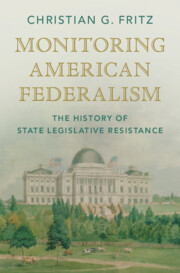(image source: CUP)
Abstract:
Monitoring American Federalism examines some of the nation's most significant controversies in which state legislatures have attempted to be active partners in the process of constitutional decision-making. Christian G. Fritz looks at interposition, which is the practice of states opposing federal government decisions that were deemed unconstitutional. Interposition became a much-used constitutional tool to monitor the federal government and organize resistance, beginning with the Constitution's ratification and continuing through the present affecting issues including gun control, immigration and health care. Though the use of interposition was largely abandoned because of its association with nullification and the Civil War, recent interest reminds us that the federal government cannot run roughshod over states, and that states lack any legitimate power to nullify federal laws. Insightful and comprehensive, this appraisal of interposition breaks new ground in American political and constitutional history, and can help us preserve our constitutional system and democracy.
On the author:
Christian G. Fritz is Emeritus Professor of Law at the University of New Mexico School of Law. He is the author of American Sovereigns: The People and America's Constitutional Tradition Before the Civil War (2008).
Table of contents;:
Introduction 1. The riddle of federalism and the genesis of interposition 2. Early state use of interposition: testing the powers of the new national government 3. State interposition and debates over the meaning of the Constitution 4. The Virginia and Kentucky Resolutions and Madison's report of 1800 5. State interposition during the Jefferson and Madison presidencies 6. State challenges to the Supreme Court's control over constitutional interpretation 7. The transformation of interposition: the theory of nullification emerges 8. State interposition and nullification on the path to secession 9. State interposition during and after the Civil War 10. Modern interposition by states and 'nullification' Epilogue.
(Source: Law & Humanities Blog)
Read more on the CUP site.


No comments:
Post a Comment
Note: Only a member of this blog may post a comment.